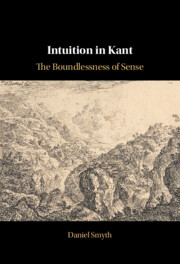Book contents
- Intuition in Kant
- Intuition in Kant
- Copyright page
- Epigraph
- Contents
- Acknowledgments
- Abbreviations, Citations, and Other Conventions
- Introduction
- 1 Reason’s Self-Knowledge and Kant’s Critical Methodology
- 2 Synthetic Judgment and Intuition
- 3 An Apperceptive Approach to the Transcendental Aesthetic
- 4 Exposition, Conceptual Analysis, and Apperception
- 5 Infinity, Discursivity, Givenness
- 6 Prolegomena to a Stufenleiter of Kantian Intuition
- 7 A Stufenleiter of Kantian Intuition, Part I
- 8 A Stufenleiter of Kantian Intuition, Part II
- Bibliography
- Index
Introduction
From Infinity to Givenness: Kant’s Apperceptive Faculty Psychology and His Top-Down Approach to Intuition
Published online by Cambridge University Press: 07 March 2024
- Intuition in Kant
- Intuition in Kant
- Copyright page
- Epigraph
- Contents
- Acknowledgments
- Abbreviations, Citations, and Other Conventions
- Introduction
- 1 Reason’s Self-Knowledge and Kant’s Critical Methodology
- 2 Synthetic Judgment and Intuition
- 3 An Apperceptive Approach to the Transcendental Aesthetic
- 4 Exposition, Conceptual Analysis, and Apperception
- 5 Infinity, Discursivity, Givenness
- 6 Prolegomena to a Stufenleiter of Kantian Intuition
- 7 A Stufenleiter of Kantian Intuition, Part I
- 8 A Stufenleiter of Kantian Intuition, Part II
- Bibliography
- Index
Summary
Sense perception is a paradigm of Kantian intuition. Yet Kant also makes intuition responsible for representing mathematical infinities, whereas sense perception is manifestly finite. Why assign such contrary cognitive achievements to a single capacity? I trace this doctrinal heterodoxy to Kant’s revolutionary methodology: viz. his faculty psychology. Unlike his predecessors, Kant bases his claims about the mind not on empirical observation nor on metaphysical reasoning but on apperceptive reflection. Performing an act of intellect constitutively involves the ability to represent oneself as doing so. And the latter ability requires one to possess (albeit implicitly and unreflectively) a concept of the relevant act-type. Kant’s faculty psychology consists in making these concepts explicit, analyzing them, and distinguishing faculties via the acts (cognitive functions) they enable. I argue that the intellect’s apperceptive grasp on the functions it does perform includes an implicit conception of those cognitive functions that it presupposes but cannot perform. These are therefore assigned to a distinct, non-intellectual capacity that serves as the intellect’s cognitive partner in generating knowledge. The intellect’s knowledge of itself thus includes an indirect knowledge of the intellect’s Other. This “top-down” approach to intuition explains Kant’s doctrinal heterodoxy. Infinite complexity must be represented intuitively because it is essential to our (Newtonian) knowledge of the world yet cannot be accounted for by the discursive spontaneity of our intellect.
- Type
- Chapter
- Information
- Intuition in KantThe Boundlessness of Sense, pp. 1 - 13Publisher: Cambridge University PressPrint publication year: 2024



